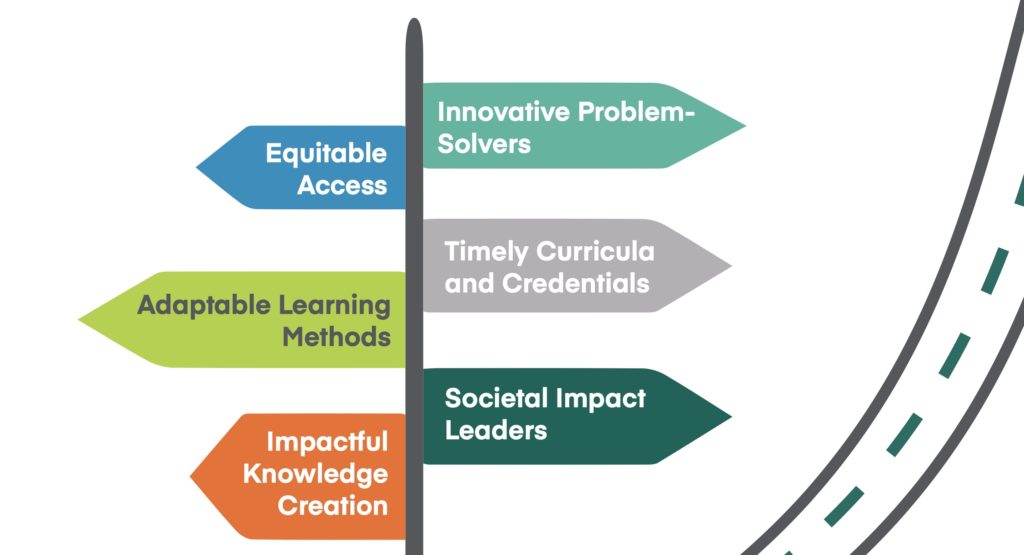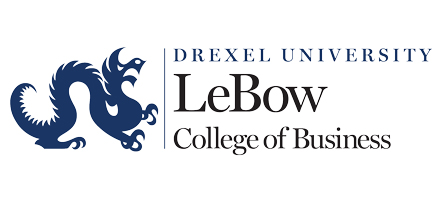
Change is constant. The question for business schools is, “How bold should that change be?”
In a new report called Pathways to Innovation, the Association to Advance Collegiate Schools of Business invites schools to answer that question demonstratively — to “lead boldly to meet the needs of stakeholders.” And it offers six pathways to innovation to help schools meet the moment.
“Business schools are being challenged as never before to adapt, be relevant, and contribute solutions to the world’s pressing issues,” says Lily Bi, president and CEO of AACSB International. “At AACSB, we invite business schools to ‘Lead Boldly’ and elevate the unique value they deliver in meeting the needs of stakeholders, from students, to lifelong learners, to businesses, and to society more broadly.”
ONE PATHWAY TO INNOVATION: EMBRACE SOCIETAL CHANGE
One of the three main global accrediting agencies for business schools, AACSB has long pushed not only for innovation among its hundreds of member schools globally but also for positive impact. In 2021, now-retired President and CEO Caryn Beck-Dudley called for schools to produce less dry and dusty academic papers and instead “more research that actually results in a positive societal impact.” And last year, as Poets&Quants reported, AACSB issued a clarion call for B-schools to ramp up their positive impact programming, calling in an open letter for “systemic change through the expertise and action of global business leaders and business educators.”
Makes sense then that among the six pathways to innovation listed in its new report, one is “Develop societal impact leaders for positive change.”
“Desired leadership competencies now include a number of ESG and societal impact values as well as being able to perform financially,” AACSB’s report reads. “Schools should cultivate ties with community groups, nonprofits, and government organizations, in addition to leveraging AACSB’s advocacy and thought leadership efforts, to help drive innovation.”
OTHER INNOVATIONS: ADAPTABLE LEARNING METHODS & ENDING ‘PUBLISH OR PERISH’
“The six steps outlined in our position paper are designed to act as a strategic tool to business schools discover ways to drive innovation across their institutions,” Bi says. Developing leaders who create positive change in society — who strive to “make the world a better place” — is just one of the six innovation pathways outlined by AACSB. The five others:
- Ensure fair access to high-quality business education and networks: “As firms prioritize developing diverse workforces, they look to business schools to create a pipeline of graduates who represent diverse demographics, experiences, values, and aspirations.”
- Empower problem-solvers to transform business: “Creating skilled, agile, resilient leaders means business schools need to shift by elevating experiential learning offerings, stronger connections with community and business leaders, and a culture that promotes and nurtures innovators, from leadership to faculty to students.”
- Create timely curricula that respond to the speed of business: “Competing with corporate-established universities and on-the-job credentials requires business schools to minimize systemic barriers to the curricular revision process, so they can develop agile, stackable, high-quality lifelong learning and upskilling experiences.”
- Deploy learning methods that adapt to learner needs: “Ongoing technological innovations such as developments in AI and virtual reality, compel business schools to evaluate their HR needs and consider strategic partnerships, training, and operational modules that allow their platforms to remain competitive. Faculty will require fresh training and expanded resources.”
- Pursue knowledge creation which impacts on business and society: “Business school research is intended for industry audiences but present academic structures and processes can delay publication and consumption in the rapidly paced business world. The culture of ‘publish or perish’ among faculty at many institutions must also be challenged.”

EXAMPLES ABOUND OF INNOVATION IN GRADUATE BUSINESS EDUCATION
AACSB’s report offers several examples of innovation at some of its member B-schools around the world. Among them is The Inclusive Product Management Accelerator at the University of Washington’s Michael G. Foster School of Business, which “broadens access to economic opportunity by increasing diversity in the product management space. The free, twelve-week professional development program is designed for mid-career professionals from historically marginalized communities who demonstrate potential to succeed in a product management career. The accelerator provides participants knowledge, professional connections, and community support to empower individuals’ success.”
Another highlighted innovation is at Carnegie Mellon’s Tepper School of Business, which, in collaboration with the School of Computer Science and Human-Computer Interaction Institute, has created the Carnegie Mellon MS in Product Management program to address a direct talent need in the market. “The degree program focuses on the preparation of product management professionals who have the right blend of skills in business, technology, user-centered design, and team leadership, as well as necessary hands-on experience,” the report reads.
Another example of innovation in graduate business education: The Gies College of Business at the University of Illinois Urbana-Champaign offers a Performance-based Admissions Track (PAT) program, “which provides learners a pathway to enrollment in its online master’s programs. The track consists of three graduate-level credit courses, which the learner must successfully complete to gain automatic admission to the learner’s desired program as a degree-seeking student. PAT offers prospective students the flexibility to experience the online classroom for credit, with no application and enrollment fee, without the commitment of pursuing a degree program.”
Read the AACSB’s full report, Pathways to Innovation, here.
DON’T MISS MAJOR ACCREDITING BODY CALLS FOR B-SCHOOLS TO RAMP UP POSITIVE IMPACT PROGRAMMING and RESEARCH THAT MATTERS: HOW AACSB IS PUSHING B-SCHOOLS TO MAKE A POSITIVE IMPACT




